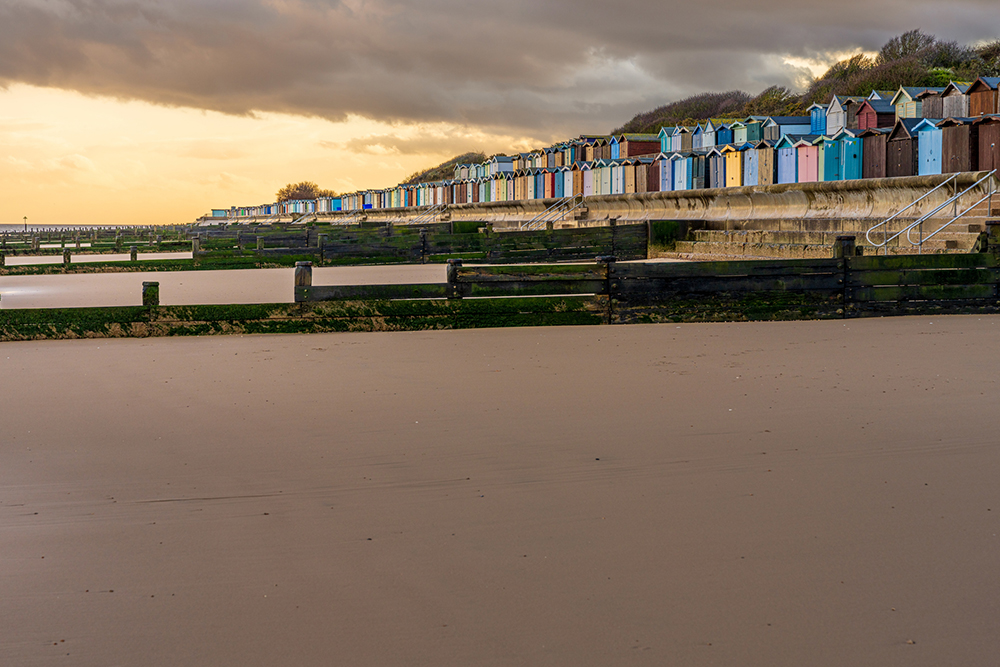
For the recent heatwave, it was my mission to escape our little Wiltshire cottage, where it hit 35°C. It has one of those very poor structural designs unique to Britain that, like plastic conservatories or the Tube, is useless in hot weather. First, we went to stay with friends in Frinton-on-Sea with our English bulldog, who was born in nearby Clacton and is shamelessly happy to be back among his people. Some years ago I lived in Colonial Williamsburg, Virginia, a living museum of America’s pre-revolutionary settler history. Frinton doesn’t go quite that far – there are no ersatz yeomen milking doleful cows – but to visit is to enter a time warp back to the mid-1930s. It’s the sort of place where Hercule Poirot might solve a crime while en vacances.
The town’s heyday was the first half of the 20th century, when society notables including Churchill and Edward VII came to enjoy the solemn whimsy of ornate villas (Dutch gables, gothic crenellations and French balconies to the owner’s taste), the pristine golf course and the elegant lawn tennis club. Most famous of all are the beach huts, a long, neat row on stilts, which contain so many people’s early memories. My grandmother lived near Colchester and every summer my mother courageously carted her six children (and, on two occasions, a cat in a basket) from Wales, across the London Underground and out to Essex for a week. Encounters with childhood nostalgia can be disappointing. The den from primary school has been tarmacked over. A favourite climbing tree has blown down. Caramac bars have been discontinued. Frinton, though, is just as I remember it. The sweet shop, the greensward, the wooden groynes covered in seaweed. The big sky and murky sea. Second homes and holiday lets are rare. Deep consideration is given to what innovations might lower the tone, and most things are rejected. There is now one pub, which opened 25 years ago, and one fish and chip shop that started in 1992. Huts have been painted cheerful pastel colours instead of the original dark brown. Other than that, Frinton is unchanged.
Is the town an example of stout local pride or stick-in-the-mud nimbyism? With its mad but lovely housing stock and proximity to London, it might have become England’s answer to East Hampton were the local council and residents not so resistant to change. As it is, you can’t even sell ice creams on the seafront. I like it. Tucked into Nigel Farage’s constituency, Frinton embodies the ‘good old days’ that so many Reform-minded people want to get back to, because those days simply never left them.
Two days later, via London where I record the Telegraph’s Daily T podcast with Tim Stanley, we head west to my parents’ house in [redacted] Pembrokeshire. The small coastal town is another delight, the secret of which makes locals and lifelong holidaymakers cry when they see it featured in Sunday supplement ‘best places to stay’ lists in case it attracts the kind of hordes who block up Cornish lanes with their enormous Range Rovers.
Costa del Cymru is a balmy 30°C and plays host to an unwelcome shoal of jellyfish who park up in the bay and a raucously fun farm wedding above the golf course. By day we swim, sandcastle, and siesta in front of the cricket and tennis. In the afternoons we loll in the garden and, in lieu of a children’s paddling pool, have great results with a washing up bowl and the lovely sensation of sticking your finger up a gushing hosepipe. At night we are treated to lobster – proudly potted by Dad – white wine and the blissful sensation of snuggling down under a duvet against the slight chill. It’s a deeper sleep than we’ve had in weeks.
At the end of the stay, Mum and I try on some hats for my sister’s impending wedding, then we play a tedious game of suitcase Tetris before travelling home in heavy rain. I drive and my husband works. It makes me think of how robust the constitutions of cabinet ministers must be, seeing as they do most of their box work from the back of a car and aren’t sick.
We arrive home to a dead lawn and the creepers of wisteria climbing into our bedroom windows like The Day of the Triffids. I check my weather apps – variable and unsettled; ho hum – and get back to work on my latest novel, which is about the shenanigans of randy young farmers in the countryside. That night I lie awake on top of the sheets in the humid darkness, sure I can ever so faintly hear the crash of waves and the cry of gulls. There is no refreshing waft of breeze, neither easterly nor westerly.








Comments